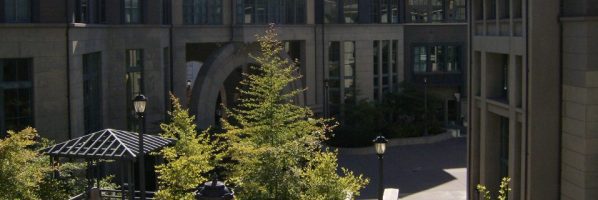The Top Deferred Enrollment MBA Programs

In the past several years, we’ve seen more and more leading business schools offering deferred enrollment MBA programs.
Traditionally, full-time work experience has been a requirement for acceptance into a leading MBA program, with students averaging five years of professional experience at the time they begin their graduate studies.
Most deferred enrollment programs still require work experience—the difference is that students can gain this experience after they earn admission. Deferred enrollment MBA programs guarantee college seniors (and sometimes graduate students) a spot in their MBA programs, allowing them to enroll two to five years after they graduate from college. This allows students to focus on their work experience with their MBA plans already in place.
Read on for information about deferred enrollment programs at:
- Berkeley Haas
- Chicago Booth
- Columbia Business School
- Harvard Business School
- MIT Sloan
- Northwestern Kellogg
- Stanford GSB
- UVA Darden
- The Wharton School
- Yale School of Management
How Deferred Enrollment Programs Work
“This type of program is for those who know that an MBA program is something they want to pursue in the future. Not directly after their undergraduate degree (in most cases), but a couple of years later,” explains Alex Brown, an MBA admissions expert at Clear Admit.
Ambitious undergraduate students apply to b-school during their senior years and then receive a promise of a seat in a future cohort. Typically, they are required to gain two to five years of full-time work experience between being accepted and starting an MBA. Once they do enroll, they join the same MBA cohort as those admitted through the traditional application process.
“Applying and gaining admission during college helps reduce the uncertainty of their plan going forward. So rather than entering an analyst program at a consulting firm, for example, with the hope of gaining admission to a top MBA program after a few years, new graduates can enter the program knowing they have an MBA option already,” says Alex. “Of course, it doesn’t stop them from changing their minds, or pursuing other MBA options and forgoing the early admission.”
These deferred enrollment programs are ideal for candidates with established leadership skills. Typically, candidates have outstanding internships, strong academic credentials, and high test scores when they apply. “Also, these candidates are still typically early in their career arch when they start their MBA programs. But, it makes sense if they are focused and really understand how the MBA program will help develop their career further,” explains Alex. “It’s good for candidates with focused career goals.”
Additionally, it’s worth noting that deferred admissions MBA programs are open to applications from students of all academic backgrounds. In addition to the finance, business, and economics majors, who are well represented in the traditional MBA applicant pool, deferred enrollment programs welcome those from a STEM or humanities backgrounds. Whatever their major, the key for applicants is to have a solid plan for the future and a good sense of how an MBA fits into that plan.

Deferred Enrollment Programs at a Glance
So, what are some of the top deferred enrollment programs and how do they vary?
At a glance, the structure of most deferred enrollment MBA programs are similar. All but Yale SOM are two years in length and place students in the same cohort as the full-time MBA. On the other hand, the Yale Silver Scholars program is three years in length, with the first and third year being the same as the standard MBA and the second year being an extended internship. The reason behind this difference is that the program accepts candidates directly after their undergraduate career without any work experience.
The rest of the programs require that students gain two to five years of full-time work experience before they start their MBA studies. However, in some cases, work experience is not required if the student is currently completing another graduate degree (this is the case for Stanford’s program).
“Generally, the students co-exist in the same program” as those admitted through the traditional process, explains Alex. “Younger students might have more energy and enthusiasm, older candidates might have more experience and insights. It can become a great blend for an academic experience.”
Another key distinction is eligibility; the Haas Accelerated Access and Wharton Moelis programs are only open to UC Berkeley and University of Pennsylvania students, respectively. In 2019, Wharton added another deferred admissions program for students from any institution, not just Penn. MIT Sloan allows MIT students with an undergraduate GPA of 4.25 to waive the GMAT, and UVA Darden, Haas, and Wharton all offer scholarships for their deferred programs.
Deadlines for each of these programs tend to fall April, around the Round 3 MBA application deadlines.
Inside the Deferred Enrollment MBA Programs at Leading Business Schools
Here’s a deeper look at the details of each school’s deferred enrollment MBA structure, eligibility, and application requirements.
Berkeley Haas Accelerated Access
The Berkeley Haas Accelerated Access program is currently only open to UC Berkeley undergraduate and graduate students in their final year of study—though there are plans to expand to the rest of the University of California and beyond in the future. The program offers early conditional admission into the Full-Time MBA program with the ability to defer for two to five years to gain professional experience. There are two application deadlines—one in April and one in June—with an application process very similar to the full-time MBA program, except the application fee is waived.
Application requirements include the application form, university transcripts, two short essays, two recommendations, a resume, and the GMAT or GRE. Interviews are then conducted by invitation only. Accepted candidates must make a $500 deposit.
To celebrate the launch of Accelerated Access, up to five $100,000 scholarship awards will be available for students applying in 2020. Upon matriculation, candidates will be eligible for other scholarships and dual degree programs.
Chicago Booth Scholars Program
The Chicago Booth Scholars program is a deferred MBA program for promising candidates looking to secure a seat in a future Chicago Booth full-time MBA cohort. It’s open to undergraduates from any institution in their senior year, and grants admits a two to four-year deferment before they begin the full-time MBA program. While working full time, students have the opportunity to engage with Booth and explore the University of Chicago community. If candidates prefer to continue working after four years, they have the opportunity to enroll in the Evening or Weekend MBA programs.
Applications are due in April, and are similar to the full-time MBA application. Application requirements include a data form, short answers, an essay, two recommendations, unofficial transcripts (official copies required of admitted students), and professional resume. International students must take the TOEFL, unless their undergraduate degrees were conducted in English. All applicants must take the GMAT or GRE; there is no preference given to either test. Interviews are then conducted on an invitation only basis.
Columbia Business School Deferred Enrollment Program
The Columbia Business School Deferred Enrollment program is open to undergraduate and Master’s students who apply during their final years of study. (Students enrolled in Ph.D. programs, law school, or medical school are not eligible.) Once accepted, they can take two to five years to enter the workforce, and start the full-time MBA program when it’s right for them. To begin the program, candidates simply send the school a letter of intent to Columbia indicating whether they want to enroll in January (16-month program) or August (20-month program with summer internship). Admitted students gain access to conferences, events, and school-wide resources prior to matriculating.
Applications are due by mid-April, and requirements include a data form, short answer questions, an essay, two recommendations, academic transcripts, and professional resume. All applicants must take the GMAT, Executive Assessment, or GRE within three weeks of applying. Interviews are then conducted on an invitation only basis. CBS releases decisions on a rolling basis, within two weeks of the interview.
In 2019, 114 candidate were admitted to the CBS Deferred Enrollment Program. Their GMAT scores ranged from 640-790, and GPAs ranged from 2.92-4.0. Forty-nine schools and 11 countries were represented in this incoming class.
Harvard Business School 2+2 Program
Harvard’s 2+2 program is perhaps the best-known deferred MBA. Candidates apply in their final year of undergraduate or graduate school, then spend a minimum of two years (maximum of four) working full-time before they begin Harvard’s full-time, two-year MBA program. This program is open to students who plan to work in the public, private, or nonprofit sector, with preference given to applicants planning to work in an operating company (tech, manufacturing, consumer goods, retail, industrials, etc.), from a lower socio-economic background, going into a technically demanding role, or pursuing entrepreneurship. Students enrolled in Ph.D. programs, law school, or medical school are not eligible; they should apply through the regular MBA admissions process.
The application is essentially the same as for the traditional MBA program, though the application fee is $100 instead of $250. The application fee is waived for active duty military applicants. The admissions deadline is in April. Candidates may enter the full-time MBA program once they have met work experience requirements.
More than 1,400 candidates applied to be a part of the Class of 2023, and 115 students ultimately committed to the program. Their GMAT scores ranged from 590-790, and their average GPA was 3.79.
Kellogg Future Leaders
Northwestern Kellogg’s Future Leaders program is open to any undergraduate student in their final year of school, as well as Master’s students who began their graduate programs directly after undergrad. Students enrolled in Ph.D. programs, law school, or medical school are not eligible; they should apply through the regular MBA admissions process.
Successful applicants defer their enrollment at Kellogg for two to five years, during which time they are expected to gain relevant work experience. Candidates may also reassess which MBA program to join; while applicants are accepted into the full-time two-year MBA program, they can also choose the Evening & Weekend or One-Year program. They may also expand their plans to consider the JD-MBA or MMM, though those require admission to the other Northwestern schools.
The application requires brief essays, a recommendation, and an interview by invitation; the TOEFL and GMAT/GRE are also conditional requirements. Non-native English speakers must take the TOEFL, unless their undergraduate studies were conducted in English. Northwestern undergraduates do not have to take the GMAT/GRE, but it is required for all other students. While there is no application fee, admitted candidates need to make an initial deposit of $500, then $500 for every year of deferment; these funds ultimately apply to tuition when they matriculate.
MIT Sloan MBA Early Admission
The MIT Sloan MBA Early Admission program is open to any exceptional undergraduate student during the year that they are graduating. Graduate students without full-time work experience may also apply. Between being accepted and starting the program, candidates are expected to seek two to five years of full-time work experience.
Applications are due in April, and requirements include a data form, cover letter, video statement, two recommendations, academic transcripts, and professional resume. All applicants must take the GMAT or GRE, but MIT students can waive the GMAT or GRE if they have a GPA above 4.2. Interviews are then conducted on an invitation-only basis. The application fee is waived for all candidates.
Stanford GSB Deferred Enrollment
The Stanford GSB Deferred Enrollment program is open to undergraduate students who want to begin their MBAs immediately after their senior year. However, students are encouraged to defer for one to three years to gain work experience (two-year deferrals are most common). They can apply during any of GSB’s three application rounds, and can choose which year’s MBA cohort they would like to enter. If they decide to defer for one to two years, they can apply for specific fellowships the year before starting their full-time MBA.
Those eligible for deferred enrollment have their application fee reduced to $100.
UVA Darden Future Year Scholars Program (FYSP)
The UVA Darden FYSP program is open to undergraduate students in their final year, as well as Master’s students. Candidates can apply in January, April, or August. Once admitted, they then go on to gain two to four years of work experience while also gaining access to the Darden alumni community for mentorship, networking, and individualized career support. Then, once ready, candidates join the regular full-time MBA program.
The application requires a GMAT, GRE, MCAT or LSAT score, but applicants are encouraged to take the GRE or GMAT before matriculating. Applicants must also submit a resume, transcripts, an essay, and two letters of recommendation. While there is no application fee, admitted candidates need to make a deposit of $500 for every year of deferment; these funds ultimately apply to tuition when they matriculate.
Wharton Advance Access Program
Undergraduate seniors and graduate students from any institution outside of Penn can apply early for the Wharton MBA through the Advance Access Program. Accepted applicants receive special professional development and career services support, as well as access to the Wharton community including annual retreats and mentoring. Applicants may apply in their senior year during Round Three of the MBA admission timeline, and are evaluated similarly to the overall MBA applicant pool. Candidates defer for two to four years of work experience, and then join the regular two-year, full-time MBA program when they’re ready.
University of Pennsylvania undergraduates, specifically, can apply through the Wharton Moelis program. The benefits mirror those of the Advance Access program, with the added potential for a $10,000 yearly fellowship (or more, based on merit).
While the application fee for the Moelis program is waived, applicants through the Advance Access program must pay a reduced application fee of $100. The application requirements for both options include unofficial transcripts, GMAT or GRE score, a resume, two letters of recommendation, two essays that are the same as the general MBA application, and interviews (Team-Based Discussion & one-on-one). Admitted candidates through either program need to make a deposit of $1,000 at the beginning of June of the year they are accepted, and then another deposit of $1,000 when they decide to matriculate. The school also expects yearly affirmation of intent to attend the program, as well as verification of work experience.
Yale SOM Silver Scholars
Students admitted to the Yale Silver Scholars program start their MBA studies immediately after college graduation. Candidates spend one year completing the core curriculum, and then undertake an extended full-time internship in year two. Then, during the third year, they return to Yale SOM to complete their degree with MBA elective courses. Students are fully integrated into the Yale SOM MBA class, but they have special programming and career development support that’s tailored to them. Candidates apply during their senior years of college.
Applicants complete the same online application as regular enrollment candidates, with nuances in the Work Experience and Activities sections of data form. Yale notes that only college seniors are eligible to apply, and they must submit two letters of recommendation. If invited to interview, candidates will meet with one or more members of the Silver Scholars committee.
This article has been edited and republished from its original source, Clear Admit.
Haas Alum Discusses Inclusion and Accessibility on Business School Campuses

Alvaro Silberstein MBA, ’17, chose to attend the Berkeley Haas School of Business not only for its proximity to Silicon Valley and educational strengths, but also because the school had a proud history of helping students with disabilities.
Continue reading…News Roundup – Haas Launches Deferred Admissions, Tuck MBAs Attend Climate Conference, and More

Let’s take a look at some of the biggest stories from this week, including UC Berkeley admissions deferment for its MBA program.
Haas Launches Deferred MBA Admissions Program – Berkeley Haas Newsroom
The Haas School of Business at UC Berkeley has announced a new program, Accelerated Access, which allows graduate and undergraduate students to defer MBA admission in order to obtain work experience.
Launching January 22, 2020, Accelerated Access will at first only be open to students in their final year of study, but UC plans to expand the program to include all students across the university system. Applicants who are accepted will gain conditional admission with a two to five year deferment period.
Morgan Bernstein, Director of Strategic Initiatives at Haas, says, “Accelerated Access is an innovative way for students to secure a seat in our MBA program, providing a way for them to pursue full-time work that aligns with their passions, with reassurance that they will be able to return to a top-ranked MBA program in a few years…We have so much talent here in the Berkeley community—and this is another way that we are cultivating and committing to that talent.”
The goal of Accelerated Access is to open admission to students who may not have previously considered pursuing an MBA due to a lack of professional experience.
The opening year of the program has two application deadlines: Thursday, April 2, 2020 and Thursday, June 11, 2020. The application process has similar requirements as the regular MBA program, with one notable difference. Haas has waived the $200 application fee for Accelerated Access students. In addition, qualified applicants will be eligible for up to five scholarships worth $100,000.
Read here for more on Accelerated Access and UC Berkeley admissions.
At COP25, Tuck Has a Front-Row Seat – Tuck School of Business News
A delegation of ten Dartmouth Tuck School of Business students attended the United Nations’ COP25 conference in Madrid last December. Led by Professor Tracy Bach, the delegation was able to observe climate change negotiations in action.

One delegate, Melena Sanchez Montanes, (T, 20), is the Director of the Tuck Social Venture Fund. She says of COP25, “It was very energizing to see all these young people committed to finding solutions to climate change and an amazing experience to see the negotiators working live on behalf of their countries and hearing what’s important to them.”
Tuck’s Revers Center for Energy and the Center for Business, Government & Society each had a hand in sending the delegation. It is one of numerous experiential opportunities offered to Tuck students interested in sustainability, impact investing, and energy innovation. Tuck offers electives devoted to the business of climate change and to leadership in the new global economy.
Another Tuck delegate Kevin Yuan (T, ’20), recently accepted a position with Nike as global manager of sustainability. He became connected with the brand at a previous COP conference in Poland, and his new position will allow him to work on such projects as seeking ways to offset Nike’s carbon footprint.
Yuan says:
“The climate crisis can seem like this huge problem, where we don’t even know where to start, and it can feel defeating and deafening. But if you find your sliver of the pie and give it everything you can give, the world will be in a better place … As the world’s largest apparel company, Nike is a bellwether, and I feel uniquely empowered to impact climate change because of Nike’s global presence.”
For more on the delegation and COP25, read here.
How I Got the Job: Program Manager II, Twitter – Vanderbilt Owen News & Events
Shanah Gaskill, a current MBA at Vanderbilt University’s Owen Graduate School of Management, recently shared the experience of her application, interview and hiring process as a Program Manager at Twitter.
Her story is part of the school’s “How I Got the Job” series. Gaskill began her career in marketing at Uber, where she eventually became a Senior Marketing Manager. There, she discovered her yen for ‘people-centered’ projects. Gaskill’s desire to use these skills prompted her to consider a future in HR, in addition to pursuing an MBA. This decision led Gaskill to the Owen MBA, which offers a concentration in Human and Organizational Performance (HOP).
“Coming to get my MBA, specifically at a school that was focused on HR, would allow me to make the jump. In [Twitter’s] interview process, being able to speak to what I was learning in class was super cool. What we learned in the HOP classes are very applicable to the HR roles that we’re going into,” Gaskill says.
Her success in the interview process won her a summer internship at Twitter, which has led to a full-time position as a Program Manager on their Global Talent Management Team. Of her new position, Gaskill adds, “I’m just really excited to work with and learn from my colleagues … They just pour so much into their employees that everyone there is so proud to work there … everyone is [dedicated to] the same mission.”
Read here for more on Gaskill’s MBA experience at Owen, including a helpful timeline of events that led her to Twitter.
World’s Leading Behavioral Science Conference Comes to the University of Toronto’s Rotman School of Management – Rotman News Releases
The University of Toronto Rotman School of Management‘s Behavioral Economics in Action at Rotman (BEAR) research center will host a global conference on behavioral science on July 13 and 14, 2020.

Behavioral Exchange 2020 (BX2020) brings together industry, academic, and government experts to explore innovations in the field of behavioral innovations. The conference’s 500 delegates will share their expertise in the areas of public health, diversity and inclusion, global finance, and sustainability as each pertains to human behavioral science.
Click here to learn more about the upcoming event.
Top 5 California Salaries for Business School Grads

California’s a great place to jump into business grad school. Depending on what part of the state you choose, you got mountains, beaches, and endless sunshine. On top of that, California is among Forbes’ best states for business. California is 31st, in fact. And with the fifth-biggest economy in the world at $3 trillion, the state offers plenty of opportunity for those looking to make it in the world of business.
Continue reading…Berkeley Haas MBA Deadlines Revealed for 2019-20

The newest wave of full-time MBA deadlines have been announced by the University of California Berkeley Haas School of Business, leading into the 2019-20 season.
Berkeley MBA Deadlines 2019-20:
Round One
Application Deadline: Sep. 26, 2019
Decision Notification: Dec. 12, 2019
Round Two
Application Deadline: Jan. 9, 2020
Decision Notification: March 26, 2020
Round Three
Application Deadline: April 2, 2020
Decision Notification: May 7, 2020
Learn more about the University of California Berkeley Haas School of Business MBA programs here.
Where Should You Go? The Benefits of a Mid-Tier MBA

You have an MBA acceptance letter from both Harvard Business School and Cornell SC Johnson. Which do you choose?
Your gut reaction might be to choose Harvard’s top-ranked MBA program without a second’s pause. After all, aren’t business school rankings—like those compiled by the Financial Times and U.S. News & World Report—the most important consideration when choosing your MBA program?
In some cases, you might be right. If you’re most interested in reputation, then ranking is all important. However, there are many times when rankings should be taken with a grain of salt. They tell a story, but not the whole story, especially when it comes to you as an individual candidate.
Just because a specific school is top-ranked, does not mean it should be the top rank for you. Many mid-level MBA programs are just as impressive and could be a better fit for you depending on your needs.
In this article, we’ll take an in-depth look at when and why you should choose a mid-ranked MBA program over a top-ranked program. Continue reading…
